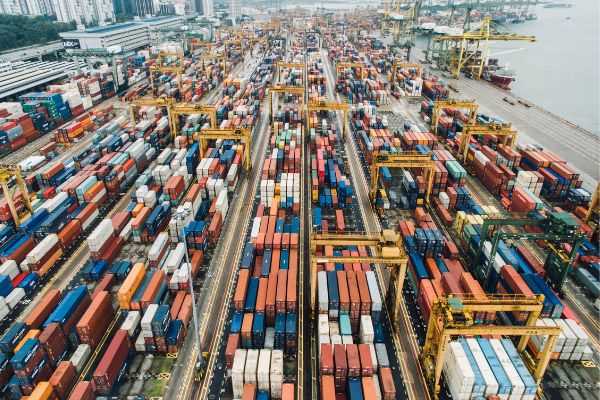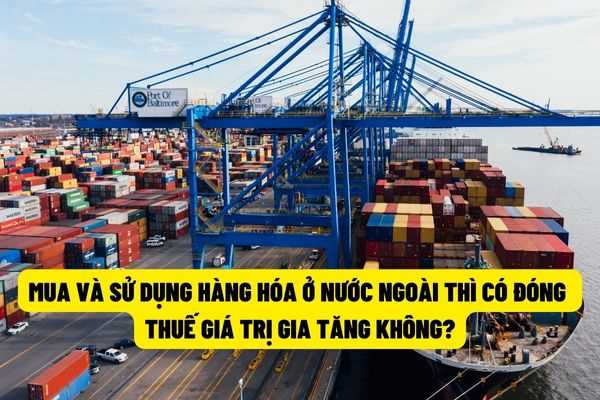If a company in Vietnam buys and uses goods abroad, does it have to be subject to import tax and value added tax if not imported into Vietnam?
- Who is subject to import and export tax in Vietnam?
- Who must pay export tax and import tax in Vietnam?
- What is value-added tax and in what cases is it subject to value-added tax under current regulations?
- In case a Vietnamese company buys and uses goods abroad, does it have to pay import tax and value added tax?
Who is subject to import and export tax in Vietnam?
Pursuant to Article 2 of the Law on Import Tax and Export Tax 2016 stipulates as follows:
“Article 2. Taxable objects
1. Goods imported or exported through Vietnam's border gates or border gates.
2. Goods exported from the domestic market into the free trade zone, goods imported from the free trade zone into the domestic market.
3. On-spot export and import goods and export and import goods of enterprises that exercise the right to export, to import, or to distribute.
4. Objects subject to export tax and import tax do not apply to the following cases:
a) Goods in transit, border crossing or transshipment;
b) Humanitarian aid goods, non-refundable aid goods;
c) Goods exported from the free trade zone to foreign countries; goods imported from abroad into non-tariff zones and used only in non-tariff zones; goods moved from one non-tariff zone to another;
d) The oil and gas part is used to pay natural resources tax to the State when exporting.
5. The Government shall detail this Article.”
Thus, the cases of goods listed under the above provisions will be subject to export tax and import tax in Vietnam.

If a company in Vietnam buys and uses goods abroad, does it have to be subject to import tax and value added tax if not imported into Vietnam?
Who must pay export tax and import tax in Vietnam?
Pursuant to Article 3 of the Law on Import Tax and Export Tax 2016 stipulates as follows:
“Article 3. Taxpayers
1. Owner of imported or exported goods.
2. Organization of import and export entrustment.
3. Persons on exit or entry have export or import goods, send or receive goods through Vietnam's border gates or borders.
4. Persons authorized to, guarantee and pay tax on behalf of taxpayers, including:
a) Customs clearance agent in case the taxpayer is authorized to pay import tax or export tax;
b) Enterprises providing postal services, international express delivery services in case of paying taxes on behalf of taxpayers;
c) Credit institutions or other organizations operating under the Law on Credit Institutions in the case of guaranteeing or paying tax on behalf of taxpayers;
d) Person authorized by the goods owner in case the goods are gifts or gifts of individuals; luggage sent before or after the trip of people on exit or entry;
d) The branch of the enterprise is authorized to pay tax on behalf of the enterprise;
e) Another person authorized to pay tax on behalf of the taxpayer according to the provisions of law.
5. Those who purchase and transport goods within the tax-free quota of border residents but do not use them for production or consumption but sell them in the domestic market and foreign traders are allowed to trade in exported goods. import and export at border markets according to the provisions of law.
6. Persons whose exported or imported goods are not subject to tax or tax exemption but then change and become taxable according to the provisions of law.
7. Other cases as prescribed by law.”
Thus, the subjects subject to the above provisions will have to pay export tax and import tax in the case of export or import of taxable objects.
What is value-added tax and in what cases is it subject to value-added tax under current regulations?
Pursuant to Article 2 of the Law on Value-Added Tax 2008, the definition of value-added tax is as follows:
“Article 2. Value Added Tax
Value-added tax is a tax charged on the added value of goods and services arising in the process from production, circulation to consumption."
Accordingly, value-added tax will be determined on the added value of goods and services from production to consumption.
In Article 3 of the Law on Value-Added Tax 2008, the subjects subject to value-added tax are as follows:
“Article 3. Taxable objects
Goods and services used for production, business and consumption in Vietnam are subject to value-added tax, except for those specified in Article 5 of this Law.
Accordingly, the objects subject to value-added tax will be goods and services used for production, business and consumption in Vietnam.
In case a Vietnamese company buys and uses goods abroad, does it have to pay import tax and value added tax?
Based on Official Letter 2311/TCHQ-TXNK dated June 14, 2022 of the General Department of Customs guiding the resolution of tax problems for Shinsei Vietnam Co., Ltd., the General Department of Customs has the following comments:
“Based on Article 2 of the Law on Import Tax and Export Tax No. 107/2016/QH14 on taxable objects, including:
"first. Goods imported or exported through Vietnam's border gates or border gates.
2. Goods exported from the domestic market into the free trade zone, goods imported from the free trade zone into the domestic market.
3. On-spot export and import goods and export and import goods of enterprises exercising the right to export, to import, and to distribute.
Pursuant to Article 3 of the VAT Law No. 13/2008/QH12 stipulating: “Goods and services used for production, business and consumption in Vietnam are subject to value added tax.”
Pursuant to the above provisions, in case BX Shinsei Vietnam Co., Ltd. buys molds from KUSATSU Company in Thailand, the goods after purchase are used in Thailand, not imported to Vietnam, no obligations arise. on import tax and value-added tax on the above-mentioned goods.
The General Department of Customs shall notify BX Shinsei Vietnam Co., Ltd. to know and implement.”
Thus, according to the above answer, in case a Vietnamese company purchases and uses goods abroad, not importing them into Vietnam, there will be no import tax and value added tax obligations.
LawNet
